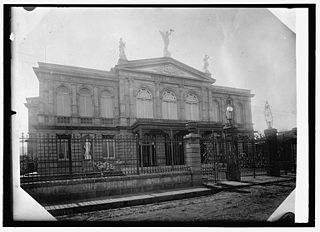Related Research Articles

The People's Vanguard Party, or Popular Vanguard Party is a communist party in Costa Rica. PVP was founded in 1931 as the Workers and Farmers Party, but was soon renamed to the Communist Party of Costa Rica.

The Costa Rican Civil War took place from 12 March to 24 April 1948. The conflict began after the Legislative Assembly of Costa Rica, dominated by pro-government representatives, voted on 1 March 1948 to annul the results of the presidential elections of 8 February, alleging that the triumph of opposition candidate Otilio Ulate over the ruling party's Rafael Ángel Calderón Guardia had been achieved by fraud. This triggered an armed uprising led by José Figueres Ferrer, a businessman who had not participated in the elections, against the government of President Teodoro Picado.
Costa Rican People's Party was a communist party in Costa Rica. In March 1984 the Popular Vanguard Party split in two factions. The majority led by Humberto Vargas Carbonell was more radical than the faction of Eduardo Mora Valverde. Both factions wanted to keep the party name. After a court decision the faction of Mora was renamed in PPC in April 1985.

Carmen Lyra was the pseudonym of the first prominent female Costa Rican writer, born María Isabel Carvajal Quesada. She was a teacher and founder of the country's first Montessori school. She was a co-founder of the Communist Party of Costa Rica, as well as one of the country's first female worker's unions. She was one of the earliest writers to criticize the dominance of the fruit companies. She won many prizes.

General elections were held in Costa Rica on 9 February 1936. León Cortés Castro of the National Republican Party won the presidential election, whilst the party also won the parliamentary election, in which they received 59% of the vote. Voter turnout was 69%.

General elections were held in Costa Rica on 3 February 1974. Daniel Oduber Quirós of the National Liberation Party won the presidential election, whilst his party also won the parliamentary election. Voter turnout was 80%.
Costa Rica became a member of the United Nations on November 2, 1945.
Henry Mora Jiménez is a Costa Rican economist and political activist. Mora is a member of the 2014-2018 Legislative Assembly of Costa Rica, serving with the Citizens' Action Party. He was the President of the Legislative Assembly of Costa Rica from 2014 to 2015.

Amelia Valverde Villalobos is a Costa Rican association football manager. She was lastly the head coach of the Costa Rica women's national football team.
The public University of Costa Rica comprises 3 radio stations, amongst which two use frequency modulation and one uses amplitude modulation. They are all three unified under the Spanish umbrella term "Radioemisoras UCR", whose director is Sylvia Carbonell.
Elena Gallegos Rosales was the Salvadoran-born wife of the 24th President of Costa Rica. During her tenure as first lady, she was responsible for furnishing and establishing the new Presidential House, performing charitable works, and accompanying her husband on various diplomatic trips.

The Liberal State is the historical period in Costa Rica that occurred approximately between 1870 and 1940. It responded to the hegemonic dominion in the political, ideological and economic aspects of liberal philosophy. It is considered a period of transcendental importance in Costa Rican history, as it's when the consolidation of the National State and its institutions finally takes place.

The Reform State or Reformist State is a period in Costa Rican history characterized by a change in the political and economic paradigm. During this period, the country switched from the uncontrolled capitalism and laissez faire approach of the Liberal State into a more economically progressive Welfare State. The period ranges from approximately 1940, starting with the presidency of social reformer Rafael Angel Calderón Guardia, and ends around the 1980s with the neoliberal reforms inherent in the Washington Consensus that began after the government of Luis Alberto Monge.
Social Guarantees were a series of progressive political reforms made in Costa Rica in the 1940s for the benefit of the working classes. They came about as a result of the alliance between various political and religious figures. Though a widespreads effort, there were three main leaders:

The Article 98 of the Constitution of Costa Rica is the article that regulates free citizen association in political parties.

The Founding Junta of the Second Republic was a de facto government which existed in the Republic of Costa Rica from May 8, 1948, to November 8, 1949, with the overthrow of the constitutional president Teodoro Picado Michalski, by a group of revolutionaries headed by José Figueres Ferrer.
Arnoldo Ferreto Segura was a Costa Rican politician and a leader of the Popular Vanguard Party.

Ana Patricia Mora Castellanos is a Costa Rican sociologist, university professor, and politician.

The Revolutionary Civic Union was the name of an armed paramilitary group and later far-right Costa Rican political party. The party was led by politician Frank Marshall Jiménez, denoted anti-communist and anti-Calderonista, who became a member of the Legislative Assembly.
References
- ↑ "Crítica del "Comunismo a la tica"" (PDF) (in Spanish). Archived (PDF) from the original on 2021-04-23.
- ↑ "Tribuna Democrática: Don Pepe y el bienestar del mayor número". 2008-07-25. Archived from the original on 2008-07-25. Retrieved 2021-09-29.
- 1 2 Zúñiga, José Roberto Herrera (2013). "9 preguntas sobre el comunismo "a la tica"". Revista de Filosofía de la Universidad de Costa Rica (in Spanish). ISSN 2215-5589.
- ↑ "Protagonistas del Siglo XX - La Nación Digital". 2009-04-26. Archived from the original on 2009-04-26. Retrieved 2021-09-29.